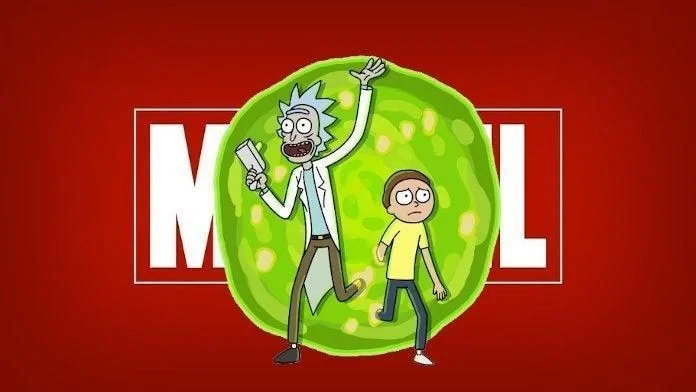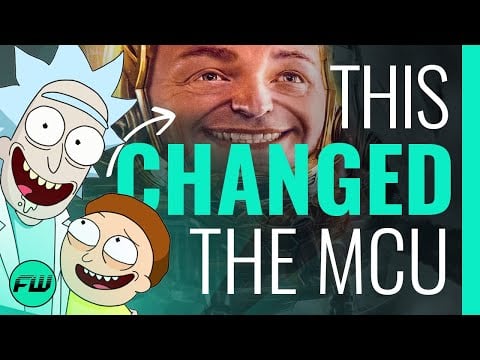In this FandomWire Video Essay, we explore how Rick and Morty influenced Marvel‘s Multiverse Saga.
Check out the video below:
Subscribe & hit the Notification Bell so you never miss a video!
Rick and Morty Changed Marvel’s MCU

The Marvel Cinematic Universe has been changed fundamentally, and it’s not because of what you might think…
In the years since the release of Avengers: Endgame, the Marvel Cinematic Universe has been struggling. Unimpressive box office performance and lukewarm critical and fan response have plagued the superhero franchise that used to be one of the most reliable in cinema. But who’s to blame?
It might be Rick and Morty.
For a show on Adult Swim that started as a Back to the Future parody, Rick and Morty has had a shocking cultural impact. When it comes to the Marvel Cinematic Universe, the show has had a massive influence on how the franchise approaches the concept of the multiverse, as well as its overall tone. However, fans should not be surprised by this fact because several writers from the animated show were recruited to work on projects in the MCU.
One of the MCU projects that is more evidently influenced by Rick and Morty is She-Hulk: Attorney at Law, which was created and show-run by “Pickle Rick” writer Jessica Gao. The project, which was not well-received, is one of the more overtly goofy and comedic projects in the Marvel Cinematic Universe thus far. The show’s self-referential humor is among the characteristics that earned it the most derision.
However, one thing that She-Hulk: Attorney at Law has that many of the other post-Endgame projects have not is ambition. Love it or hate it, She-Hulk knows exactly what it is, and it’s not afraid to do something different. This may be the best lesson Marvel could learn from Rick and Morty: even when the show has a tremendous miss, it goes all-in on the concept. Generally speaking, the MCU feels a little too timid for its own good.
Another prominent Rick and Morty writer who would later work on the MCU is Jeff Loveness, who was behind “The Vat of Acid Episode,” one of the most beloved episodes of the adult animation show. His Marvel project, Ant-Man and the Wasp: Quantumania, was not as well-loved as his work on the height of Rick and Morty, sharing more of a reaction with the low of “Claw and Hoarder,” which Loveness also wrote.
The influence of Loveness’s Adult Swim tenure is evident in the third film of the Ant-Man trilogy. Although the Ant-Man movies have always been comedic, thanks to the influence of Edgar Wright on the first film and director Peyton Reed on the entire trilogy, Quantumania takes this silliness to new levels — so much so that some fans complained they couldn’t take the film seriously.
Rick and Morty creator Dan Harmon even supposedly conducted uncredited consultation and consulting on the first Doctor Strange. Consulting Harmon, even for one of the most self-serious entries in the Marvel Cinematic Universe, shows the value that Kevin Feige and the rest of the top brass at Marvel Studios place on a background in Rick and Morty.
However, the Rick and Morty creative who has had the most influence on the Marvel Cinematic Universe — and will continue to in the future — is Michael Waldron. Waldron was the creator and head writer of the Loki series, writer of Doctor Strange and the Multiverse of Madness, and was hired to write on the next two Avengers movies, The Kang Dynasty and Secret Wars.
Interestingly, of the Rick and Morty writers who transitioned into the MCU, Waldron is probably the one who has had the most success. Loki is among the most acclaimed projects post-Endgame because Waldron understands what makes the multiverse interesting. Of course, there are still a few goofy throwaway gags like Alligator Loki and easter eggs like Richard E. Grant’s Classic Loki. Still, the show focuses more on the dynamic between the characters and their different variants.
Waldron’s other Marvel project, Doctor Strange in the Multiverse of Madness, didn’t fare so well. The film earned divisive reviews, and while the overall perception was still mostly positive, criticism was levied against the film for its poor use of the multiverse.
Indeed, the Rick and Morty influence can be heavily seen in the “quirky” alternate dimensions of Doctor Strange in the Multiverse of Madness. The multiverse inherently has limitless potential. And yet, in Doctor Strange in the Multiverse of Madness, the most significant difference in one of the worlds is that the red light means “go” instead of “stop.” If this is the most creative way they could think to use the multiverse, something is missing.
Some fans have gone so far as to question why the Marvel Cinematic Universe is taking its inspiration from other multiverse media like Rick and Morty when there is a long history of the multiverse in the source material. The writers could have adapted countless worlds to the screen, but instead, they created a bunch of throwaway worlds that amount to little more than a simple gag.
Harmon himself credited the comics for creating the multiverse in an interview. Yet, the modern approach to the multiverse seems primarily driven by the Rick and Morty style.
The chief characteristic of Rick and Morty is its humor. Although the show has a much darker, more depraved style of humor than we have seen in the MCU, the show’s silly approach to the multiverse is now taking hold in the superhero franchise. The MCU’s only “serious” multiverse project is Spider-Man: No Way Home, which no one related to the Adult Swim show touched.
A comedic approach to the multiverse works much better in the context of Rick and Morty than it does in the Marvel Cinematic Universe. In Rick and Morty, the duo can visit some strange world in one episode, and it has minimal impact on the overall canon. They can simply never go back, and the show moves on. But the moment you introduce a new world to the MCU, the entire story of the franchise changes.
Another thing that defines Rick and Morty’s approach to the multiverse is its explanation of the mythology behind the multiverse. There are two extremes when explaining what’s happening: an exposition dump that’s dense and not particularly understandable or throwing the audience into the world and expecting them to catch up.
These approaches work in Rick and Morty because it’s the point of the joke. Fans of the show are just supposed to accept that these weird worlds exist, but when it comes to the Marvel Cinematic Universe, fans expect to be able to understand the canon and world. In other words, fans tend to take the MCU a lot more seriously than Rick and Morty‘s fans do that universe. Turning the MCU’s multiverse into a joke would always be a decision that would divide fans.
The final key characteristic of Rick and Morty’s approach to the multiverse is its meta-humor. Although the meta-ness of the Marvel Cinematic Universe has primarily been limited to the self-referential gags towards the end of She-Hulk: Attorney at Law, the introduction of Deadpool into the franchise with the upcoming Deadpool 3 could inspire more MCU projects to continue breaking the fourth wall in the future.
The issue of using these Rick and Morty writers in the Marvel Cinematic Universe comes down to the lack of a cohesive vision after the Infinity Saga. Many fans have started to grow disillusioned with the MCU — and comic book movies at large — in the years since Endgame. Just look at the massive underperformance of The Marvels at the box office. And this is because while you could see the building blocks of the Infinity Saga coming together, it felt much more naturally planned out. The ties between the chapters of the post-Endgame MCU feel more corporate synergy-driven than narrative-driven.
Unfortunately, much of this “Multiverse Saga” has been defined by ambitious swings and misses, followed by course corrections that will fundamentally change the canon of the MCU. Although some of these are outside of the control of the creators — like would-be franchise villain Kang actor Jonathan Majors being disgraced due to domestic violence allegations, forcing the intended path to change directions — other changes in the approach have been due to the mixed to negative many of the most recent entries have received.
The Marvel Cinematic Universe is no stranger to making big changes in everything from casting to entire storylines. Edward Norton played Bruce Banner in 2008’s The Incredible Hulk before Mark Ruffalo replaced him for the remainder of the MCU. The role of James Rhodes (aka War Machine) was played by Terrence Howard in the first Iron Man but was recast with Don Cheadle in the second film and the rest of the franchise. And the MCU’s attempt to introduce the Inhumans via the ill-fated TV show has been entirely glossed over.
In many ways, the MCU has reached a point where it is using the multiverse as a get-out-of-jail-free card. If something doesn’t work out well, it can be retconned and explained away as part of the multiverse. And while the MCU could be using this to do something more ambitious — and in some cases, the creators are, like making a spin-off series for a different variant of Loki — there have been discussions of bringing characters, like Robert Downey Jr.’s Tony Stark, through the multiverse.
The MCU has had a long history of finding its writers and filmmakers in unexpected places. Before they made Captain America: The Winter Soldier and were given the ship for Infinity War and Endgame, the Russo Brothers came from the world of sitcoms, their best-known work being Arrested Development and Community.
On paper, another multiverse-traveling adventure like Rick and Morty may seem like a perfect resume-builder for a Marvel movie. However, it is becoming clear that the approach of that show to the multiverse and the approach fans expect from their knowledge of the comics don’t align. Perhaps it’s time for Marvel to find a new farm for their creatives than Adult Swim.
What do you think? Does the Rick and Morty approach to the Multiverse Saga work for you? Or would you rather see the MCU head in a more serious direction? Be sure to let us know in the comments below, and as always, be sure to like and subscribe. Until next time!
Follow us for more entertainment coverage on Facebook, Twitter, Instagram, and YouTube.



